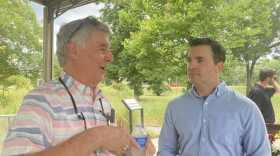The Eastern Band of Cherokee will start selling recreational marijuana to members of federally recognized tribes on July 4.
Forrest Parker, general manager of Qualla Enterprises, which runs the tribe’s marijuana dispensary and grow operation, said business has been good since medical cannabis sales were introduced earlier this year.
“We’re very excited to see the business and visitation. On a given day, we tend to turn away a lot of people so that’s a good sign, too,” Parker said in June.
Following last year’s voter referendum to expand to recreational use and sales, the Eastern Band of Cherokee Tribal Council passed an ordinance, ratified by Chief Michell Hicks, further legalizing cannabis on the Qualla Boundary.
The Great Smoky Cannabis dispensary opened in April for medical marijuana sales only. This Thursday at 10 a.m., the dispensary will start selling cannabis products for recreational use.
Initially, sales are permitted only to Eastern Band of Cherokee enrolled members and others with a federally recognized tribal ID card.
It is unlawful for anyone under 21 years old to possess marijuana or to sell, give or transfer marijuana to those who are underage.
Parker said the dispensary's goal will be to make products available to the general public as soon as August.
The move to recreational sales will require the Great Smoky Cannabis Company to prepare for more sales. That will include new protocols, more staff and other updates.
"We're building a business and serving a market at the same time so it works really well because we are able to take the things that we learn and implement them very fast," Parker said.
Great Smoky Cannabis held a job fair on June 25 to hire for the expanded services. The company employed 120 employees in June. Parker said they will need to hire a couple hundred more people this year to keep up with recreational marijuana demand.
Part of the June ordinance that approved the sale of recreational marijuana included two floor amendments: one amendment made it illegal for non-tribal government-owned businesses to sell hemp on the Qualla Boundary and another that allowed medical marijuana card holders to grow up to four plants in homes without children. Tribal Council overturned the amendment at a protest hearing on June 27.
During the meeting, Tribal Council heard a protest letter from enrolled member Robert Mark “Birdie” Saunooke. He sais that the hemp amendment would hurt him financially as the owner of two stores called “Native Cloud” which sell hemp products.
“The closing of my stores will have a direct impact causing great financial harm including unsold inventory, fired employees, canceled contracts and inability to pay lease payments and other obligations,” he said in the letter. “It is my hope that Tribal Council will reconsider this decision.”
Tribal council overturned both amendments during the protest meeting.
Cherokee Attorney General Michael McConnell explained that homegrown marijuana is now not permissible. Tribal Council members say they plan to take up the issue later.
Former Secretary of Agriculture and Natural Resources Joey Owle spoke at the Jun 27 ordinance protest hearing in favor of allowing home grow and voiced concerns about the Tribe’s monopoly on marijuana on the Boundary.
“I think Cherokee would be the only place in the entire country with cannabis law that doesn’t allow people to grow their own plant ,” Owle said at the meeting.
Owle added that the Tribal Council’s restrictions on marijuana go against the 2023 voter referendum.
Chief Hicks responded that he did not think that the referendum vote mentioned growing marijuana or encouraging entrepreneurship.
“The vote was for the tribe to control (marijuana) just like we do alcohol. It was not to create cannabis shops throughout Cherokee. So I didn’t see any intent for entrepreneurial spirit within this,” Hicks said at the meeting.
McConnell agreed that the September referendum was to regulate the marijuana market and did not mention home grow laws.
“From AG’s perspective, we prefer that the tribe not allow home grow. I’m coming to that issue from a regulatory/enforcement angle. I’m not making any statement about whether it’s good for a person or not good for a person,” McConnell said in the meeting. He recommended that the Tribal Council take up a home grow code at another time.







